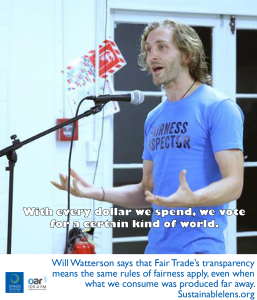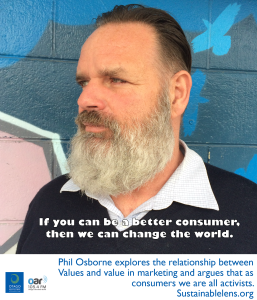There’s a strong technical solution bias – ICT is the new technical fix that will allow us to not change our lifestyles in order to achieve sustainability – and of course that’s hard to say no to, it’s very tempting to believe in such a narrative.
Dr Josefin Wangel is Associate Professor in sustainable urban development at the Division of Environmental Strategies Research at KTH in Sweden. Her focus is on how sustainability is understood and put to practice in urban planning and policy making. She uses futures studies (mainly backcasting and design fictions), systems analysis (including target formulation and sustainability assessments), stakeholder analysis and discourse analysis.
Talking points
I knew wanted to try to save the world through environmental engagement of some sort.
I studied sciences because I thought that if I knew the sciences then people would listen to me – today I can see that that was a naïve understanding of the workings of society.
As an 18 year old, my understanding of a lack sustainability was that it was a lack of knowledge that makes society unsustainable.
I quickly realised that people knew, that it was bad for the environment to drive a car, for example, but still they drove a car -and that is when I realised that my natural science based education wasn’t really apt for answering the questions that I had.
Today if I had to choose, I would place myself more in the social sciences than the natural sciences.
Why aren’t we behaving in the way we should be behaving in order to save the planet?
The discrepancy between our stated intention and what we actually do can be found at all layers of society from the individual, through the community to the planners and politicians. I think this is where we can find leverage points to actually start doing sustainability.
Environmental effects are disconnected in time and space. If I eat chocolate I know the effects on me, but if I drive the car everyday then the effects are somewhere else, ten years from now – these effects are harder to grasp.
Sustainability issues are the result of collective action, or collective inaction. I don’t gain weight when my partner eats chocolate.
Sustainability is more than the functioning of ecosystems, the other dimension is social issues. However, I don’t think sustainability is the right word for social issues, it should be social justice or social desirabilities – for me sustainability – the ability to sustain is very much connected to the ecosystems.
Three step model: Brundtland…pillars interact. Then de-construct…a discursive perspective, talking of multiple sustainabilities, that our understanding of the world is always socially constructed…then students have to make up their own construction…that links to their own discipline.
It is important to dare to be very serious about the threats implied by surpassing the planetary boundaries.
The trick is to get them to realise at the bottom of their hearts what sustainability is about, and how deeply unsustainable and unfair the world is today. And then provide them with the tools for doing something about that.
If want sustainability to last…then people have to care at a personal level,
“Sustainable†urban development areas in Stockholm…show window for Swedish sustainability and ecotechnologies…however none of these areas are actually sustainable if by sustainable you have an understanding of absolute levels of pressure that the ecosystem – if you look at resource use, these areas aren’t sustainable, and if you look at resource use in terms of the global population it becomes obvious these areas aren’t socially just either.
This does come very close to greenwash.
There’s a strong technical solution bias – ICT is the new technical fix that will allow us to not change our lifestyles in order to achieve sustainability – and of course that’s hard to say no to, it’s very tempting to believe in such a narrative.
We in Sweden have wonderful life, but that is only possible because people in other parts of the world have lousy working conditions and suffer environmental degradation that the production of consumption good sold in Sweden results in.
For us, the status quo looks like the best option, but at the global scale, and taking social justice into consideration, then it isn’t sustainable.
As an individual it is hard, sometimes impossible, to see the consequences of collective actions and take responsibility for it.
(is sustainability a luxury?) You choose what to invest funds in, you can choose to invest in highways, or you can choose to invest in railways.
Do it yourself urbanism: people having opportunity to influence built environments themselves.
(Success) Interview in a big daily newspaper, I was able to start a national discussion about alternative discourses of sustainability.
(Activist) I used to be.
(Your teaching and research is normative) if you have a title with the word sustainability in it, then you are, at least if you are doing what your title says you are.
(Motivatation) I really love my work. I get to work on something I find super interesting and important.
(Challenges) Getting married. I was just appointed of director of collaboration and impact.
(Miracle) That everyone would realise the two dimensions ecological sustainability and social justice – and that economy is just a part of the social. The wedding cake, but with only two layers.



